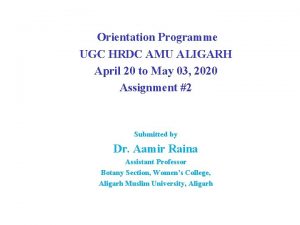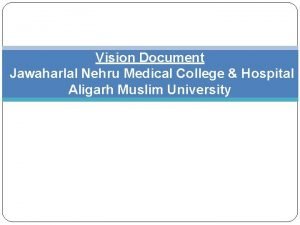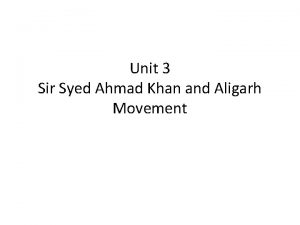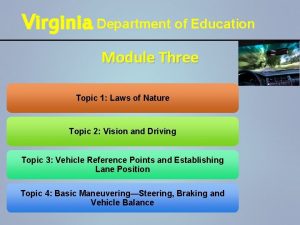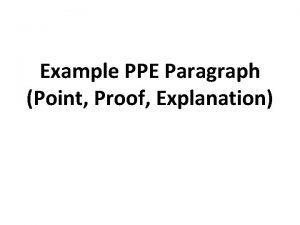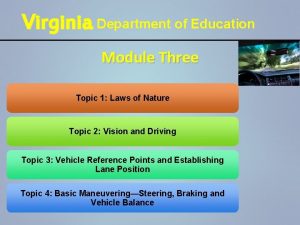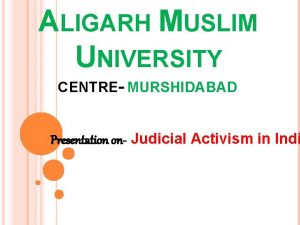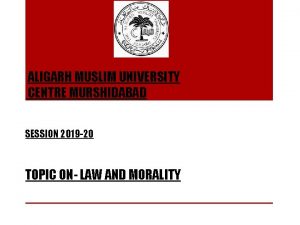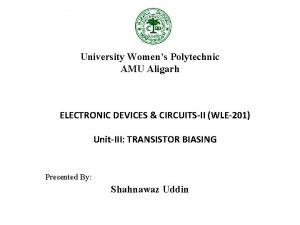ALIGARH MUSLIM UNIVERSITY TOPIC CONCEPT AND NATURE OF











- Slides: 11

ALIGARH MUSLIM UNIVERSITY TOPIC: ‘CONCEPT AND NATURE OF JUDICIAL PRECEDENT’

Synopsis § INTRODUCTION § PRECEDENT AS A SOURCE OF LAW § NATURE OF JUDICIAL PRECEDENT § KINDS OF JUDICIAL PRECEDENT § DO THE JUDGES MAKE LAW § CASE LAWS § CONCLUSION REFERENCE

INTRODUCTION Every developed legal system possesses a judicial organ. The main function of judicial organ is to adjudicate the rights and obligations of the citizen. Inductive Method is the way to use the previously decisions given by superior court and from particular cases the judges deduce generals rules, apply them on the cases before them and decide them accordingly. And deductive Method is the case is solved according to law, the judges do not look the previously decided cases of similar nature. this method is applied only on particular cases. The judges take guidance from the previous decisions on the point, on same case and rely upon them.

PRECEDENT AS A SOURCE OF LAW § Precedent as a previous instance or case which is, or may be taken as an example of rule for subsequent cases, or by which some similar act or circumstances may be supported or justified , In general use, the term ‘precedent’ means some set pattern guiding the future conduct. In the judicial field, it means the guidance or authority of past decisions for future cases. § When decisions as lay down some new rule or principles are called Judicial precedent. Act as a source of law for solving the similar disputes before the deciding authority.

NATURE OF PRECEDENT A Judicial precedent is purely constitutive in nature and never abrogative. This in other words means that it can create law but cannot abolish it. The judges are not at liberty to substitute their own views where there is a settled principle of law. The process of judicial decision making may be either Deductive or Inductive. Deductive method is associated with codified system of law. Inductive method involves reasoning and in the process, the judge is bound by the decision of the courts higher than his own court. So Deductive method may explain legal stability but it cannot account for legal change.

KINDS OF PRECEDENT Two kind of precedent broadly speaking – {1} AUTHORITATIVE – It is one which has a binding force and judge must follow it whether he approves it or not. Authoritative precedents are the decisions of superior court of justice which are binding on subordinate courts. {2} PERSUASIVE - On other hand, it is one which the judges are under no obligation to follow but which they may take into consideration. THUS, Authoritative precedents are the legal sources of law while Persuasive precedents are merely historical sources.

DO THE JUDGES MAKE LAW Two theories are there to make law by the judges which are – {1} DECLARATORY THEORY- According to ‘BLACKSTONE’ “These judicial decisions are the principle and the most authoritative evidence that can be given of the existence of such a custom as shall from a part of common law”. and further says the precedents must be followed where the same points come again in litigation. But not absolutely binding, they can be disregarded when they are absurd or unjust. {2} JUDGES MAKE LAW - ‘GRAY’ says “whoever hath an absolute authority not only interpret the law but to say, what the law is, is truly the law giver” he was on favor of judges make law on which points of the cases of first impression are distinct contributions to the existing law. JUSTICE MARKANDEY KATJU – Judiciary can only enforce laws, not make them.

CASE LAWS § In State of Kerala v/s Vasudevan (1975 Cr. L. J. 97) - No two cases could be similar, its own decisions which were essentially on questions of fact could not be relied upon as precedents for decisions of the other cases. § In Indian oil Corporation v/s Municipal Corporation (A. I. R. 1995 S. C. 1490) – The expression ‘ALL COURTS’ used in article 141 refers only the courts other than the supreme court, Thus the Supreme court is not bound by its own decisions, except to the extent that a smaller bench is bound by the decision of a larger bench and that of a co-equal bench. § In Kesavanand Bharti v/s State of Kerala (A. I. R 1973 S. C. 1. 461) – Justice Homes ‘I recognize without hesitation that judges do, must legislate, but they can do so on interestlessly ; they are confined from molar to molecular motions.

CONCLUSION § Judicial precedent is a way to solve the cases on same points before the court which has been already solved and used the decision of solved case as a positive point to solve the case. And court also followed the ‘doctrine of precedent’ because to remove the complexity in the judgement of other court on same points. And the judges perform some creative function to solve the case, and pass judgement. The doctrine of precedent is followed or decisions given by the judges and courts. So ultimately effected on the society and for the clarification of complexity of judgement.

REFERENCE § TRIPATHI MANI B. N , JURISPRUDENCE THE LEGAL THEORY, ALLAHABAD LAW AGENCY (FARIDABAD) , 19 TH EDITION 2013. § PARANJAPE N. V , JURISORUDENCE AND LEGAL THEORY, CENTRAL LAW AGENCY (ALLAHABAD), 6 TH EDITION 2012.

THANK YOU
 Aligarh muslim university orientation programme
Aligarh muslim university orientation programme Jnmc hospital aligarh
Jnmc hospital aligarh Victoria school ghazipur
Victoria school ghazipur Clincher sentence examples
Clincher sentence examples Research problem example for students
Research problem example for students Nature and nature's law lay hid in night
Nature and nature's law lay hid in night Module 3: topic 1 laws of nature
Module 3: topic 1 laws of nature Point proof explanation format
Point proof explanation format Mockingbird n5 15
Mockingbird n5 15 Topic sentence about nature
Topic sentence about nature Explanation paragraph sample
Explanation paragraph sample Module 3 topic 1 laws of nature
Module 3 topic 1 laws of nature
